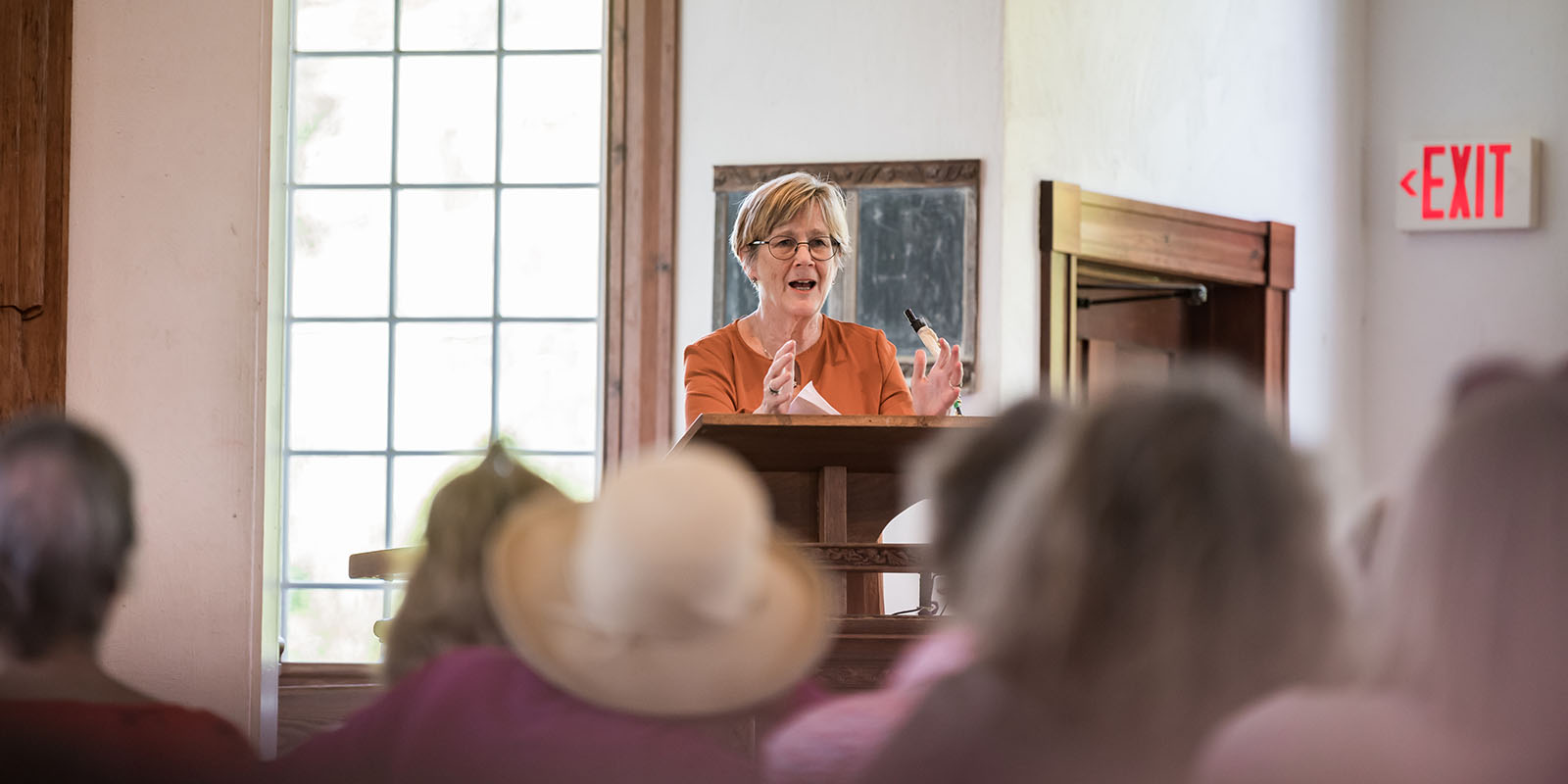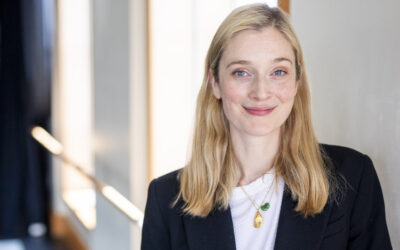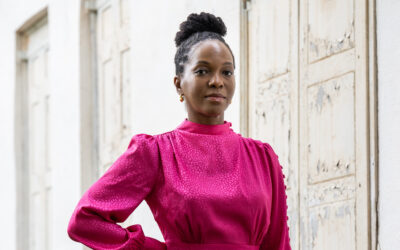
A 14-year-old announces in a therapy session that he’d rather be wanted by the police than by no one at all. How to respond, according to Dr. Kate Morse Erwin ’69, is “the essence of prison psychiatry.” In her 30 years as a forensic psychiatrist, counseling at-risk youth and individuals in the prison system, she has witnessed firsthand the devastation of lives and families wrought by America’s system of mass incarceration, and by the failure of social services and struggles of impoverished communities, besieged by violence, that have contributed to swelling prison populations. She also observes daily how much imprisoned individuals, including those serving the longest sentences, are in need of care.
In presenting Erwin with the 2019 Joan Shaw Herman Award for Distinguished Service in June, Jamie Comstock ’82, P’17, chair of the Joan Shaw Herman Award Committee, called her passion for improving mental health for the incarcerated “rare and unparalleled.”
Erwin spoke during her 50th reunion at Concord Academy. She traced the change in the U.S. incarceration system, since the 1970s, from penitentiaries — based on a model of reform — to prisons predicated on punishment. She described how the deinstitutionalization of psychiatric patients over the last 50 years resulted in an influx of inmates with mental illness. And she asked her audience to consider some sobering statistics: With only 5 percent of the global population, the United States holds 31 percent of the world’s inmates. More than half of the men and women in prison have children. “There’s a huge trickle-down effect from that,” Erwin said. If current trends continue, she said, one in three African American men born today will be imprisoned during their lifetime. “It’s just got to stop,” Erwin said.
The work for which she was recognized, however, doesn’t depend on that system changing. “The three C’s of correction are care, custody, and control,” Erwin said. And care is where she comes in. She has served as an assistant professor of psychiatry and pediatrics at UMass Memorial Medical Center in Worcester and also manages a private practice in forensic psychiatry. But the majority of her one-on-one time with patients takes place behind the double-sealed doors of maximum-security or supermax prisons, sometimes on death row and often within special units for the mentally ill, whose population, when combined with the mentally ill in jail, is up to 10 times greater than those in America’s state hospitals.
There are barriers to providing exemplary care in a prison. Upon first entering a men’s maximum-security state correctional institution in Pennsylvania as a young doctor, Erwin was struck by the quiet lobby’s likeness to a 1970s junior high school. After being evaluated for contraband and passing through to the crowded, loud, grimy area where the prison population was housed, she felt as though she had traveled to another country.
Indeed, prison lingo was, at first, bewildering, like hearing a foreign language. “My first month, I understood maybe a third of what was being said,” Erwin said. Eventually, she came to understand that her patients — many of whom had committed murder, robbery, or rape — could be manipulative, deceptive, and physically threatening, but might also be funny, well-spoken, or, conversely, totally unable to understand or negotiate for their needs. They’re also, as she came to know them, brothers, sons, and fathers. “You can’t work in prison unless you can see them as human beings,” she said. “You have to be able to suspend judgment.”
Prisons are obligated to provide medical and psychiatric care to their inmates. But for psychiatrists, learning to provide exemplary care within a system that dehumanizes inmates presents a steep learning curve. Erwin detailed several occasions on which, without fully understanding the cultural norms of an institution, she put herself or an inmate in jeopardy.
“One rule in prison is,” she said, “you don’t take anything from anyone, no matter what it is.” Once she slipped while walking across the prison yard. An inmate came over and offered his arm to her. “He could have gotten in big trouble for that, and so could I,” Erwin said. “It’s sad, because we want those who have the instinct for kindness to be able to use it — we want to reaffirm it.”
But safety is — and must be, she said — the foremost priority. Erwin has to be aware of her surroundings and vigilant about the moods of paranoid patients. “It leaves you with a second job, which is to watch your back the whole time,” she said.
Erwin has come to appreciate the good sense of humor correctional officers often have — and humor, along with a key ring, she said, is one of the best tools she has in prison. “Humor makes people feel liked,” Erwin said, “and one thing prisoners never feel is that they’re liked.”
Never having dreamed of receiving an award for the one-on-one work she does with a population that is hidden from the sight of many in the United States, Erwin recounted why she still finds her work, despite all of its risks and hardships, so rewarding.
At a women’s prison, early in her career, Erwin once took care of a patient who had gained some 90 pounds as a side-effect of the antipsychotic medication she had been prescribed. Erwin started her on a different medication and began weighing her weekly as the woman lost pound after pound. “The look on her face as I did so is etched forever in my mind,” Erwin said. “She stood in startled amazement with a half-smile, totally surprised and overwhelmed that someone would care enough about her to care about her 90-pound weight gain and would be thrilled along with her when she lost weight.”
That was the moment that hooked Erwin on practicing psychiatry in prison.
“I’ll tell you what I’ve found,” she told the audience of CA alumnae/i. “It’s that service to others really is primarily a service to yourself. It’s hard to feel better than seeing a look like that on a woman’s face.”
The Joan Shaw Herman Distinguished Service Award is the sole award bestowed at Concord Academy — not to a student, but to an alumna or alumnus. Established in 1976, the award honors Joan Shaw Herman ’46, who was paralyzed after contracting polio the summer after her graduation. Although confined to an iron lung, she worked constantly to improve the lives of people with disabilities. Each year, a CA graduate is honored with this award for service to others at the Alumnae/i Assembly, gives a talk during their reunion. Many later return to campus to engage with faculty, staff, and students.


